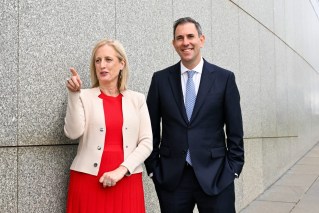Want to do away with the office? Think carefully about what we’ll be leaving behind
As the working world moves rapidly into the “new normal” of post-pandemic existence, the end of the traditional office will be one of the biggest cultural shifts, writes Shane Rodgers.


Steve Carell and the cast of The Office - which would not be nearly as funny in these work-from-home days. (File image)
With the Covid tsunami receding, we can start to properly examine how much of the change of the past three years was a short-term glitch and how much represents a fundamental rewriting of how we live and work.
Two things are clear:
• The digital transformation of workplaces has done a substantial fast-forward. It is not about to go backwards.
• Many “knowledge” workers have re-adjusted their whole life-balance dynamic around more flexibility in their work location. They are not going to give that up easily.
Research published by the Gallup group found about 25 per cent of workers had now cemented the right to work fully remotely and more than half could split their week between the office and other locations.
If these figures lock in, there will be ongoing profound implications for office space and the very nature of the way workforces interact.
For starters, most companies with workforces that can viably do their work remotely, have experienced low utilisation of their office space over the past two to three years. The longer this goes on, the harder it becomes to justify the cost.
This creates some challenging threshold decisions. At what point do you stop having a desk for every employee? So-called “hot desking” has been around for a long time, but the majority of white-collar workers are accustomed to “nesting” at a desk with family photographs, personal memorabilia, and a carefully organised stationery drawer.
Personally, I have been experimenting with hot desking my office workspace since 2020. To be honest, it took a few months to get used to it. Now it feels normal and there is something cleansing about leaving an unnested workspace at the end of each day. It is a bit like renting a holiday unit. It is “home” for a period, but it feels okay to hand it back.
Nonetheless, these changes cannot be treated lightly. Once the number of desks is less than the number of workers we have new challenges around how to organise the space. Do you just work on average numbers and hope you have enough seats every day? Or do you book a seat and, once they are gone, you lose the option to come in?
A potential consequence of that is the need for more office management rather than less. By definition, it requires us to broker and manage our space, not just take it for granted.
Hybrid work also throws up some new challenges around workplace interactions we previously took for granted. I have heard a lot of cases of people losing new staff because, unless they got to know fellow workers pre-pandemic, the opportunities to meet them now are far less defined.
Younger workers, in particular, can find it hard to learn because so much of that was previously invisible – picking up tips, seeking advice and learning new skills purely by watching and interacting with more experienced colleagues.
Some companies are still living in hope that once things “settle down” workers will return, and the old office interaction dynamic will be restored. As time goes on there are many forces working against that.
One is purely financial. Previously workers might have spent several hundred dollars a week travelling to the office through traffic or in crowed public transport, paying for after-school care for children and buying their lunch.
Working from home they can avoid most of those costs and families have already banked them back into their weekly budgets.
Similarly, for businesses, once you commit to less office space and less costs around having a large workforce on site every day, it is a big call to re-invest the funds.
As the corporate world comes under heavy pressure to achieve net-zero carbon footprints, there are significant carbon savings to be made by taking people off the roads and reducing the energy requirements of a workplace.
The changes have created some interesting debate around what our offices should look like. Architect Martin Henn, writing for Bloomberg’s City Lab project, said that prior to the pandemic many companies were creating “playground style” workspaces with the comfort of a “living room”.
This style of workplace was designed to give employees a vibrant space with all the comforts of home. Perversely, when the pandemic hit, these employees worked out that they could have all the comforts of home by staying at home!
Henn argues that offices should move beyond “passive receptacles” for existing modes of work to “active forces” that help accelerate innovation and support a new kind of workforce.
In this context, it is likely that the next five years will see some of the most radical thinking around office spaces we have ever seen.
Retaining talent will require just the right mix of flexibility and interaction and a deft touch in making calls around the option to attend an “office” rather than a requirement to do so.
In many cases, the issues go beyond a simple matter of whether someone is at home or in the office. Plenty of companies have moved towards globally managed workforces where geography is largely irrelevant and, in some cases, there is no permanent bricks-and-mortar base.
Overlaying this are some serious reappraisals of how people approach work and, anecdotally at least, a push towards more part-time options and portfolio-style careers.
All these changes will impact on the way we re-imagine office space.
In that respect, it is quite an exciting time. Offices were probably overdue for some lateral-thinking attention. Release the creative hounds!
Shane Rodgers is a business executive, writer, strategist and marketer with a deep interest in what makes people tick and the drivers of change. Comments in this article are personal and not related to my day job.











